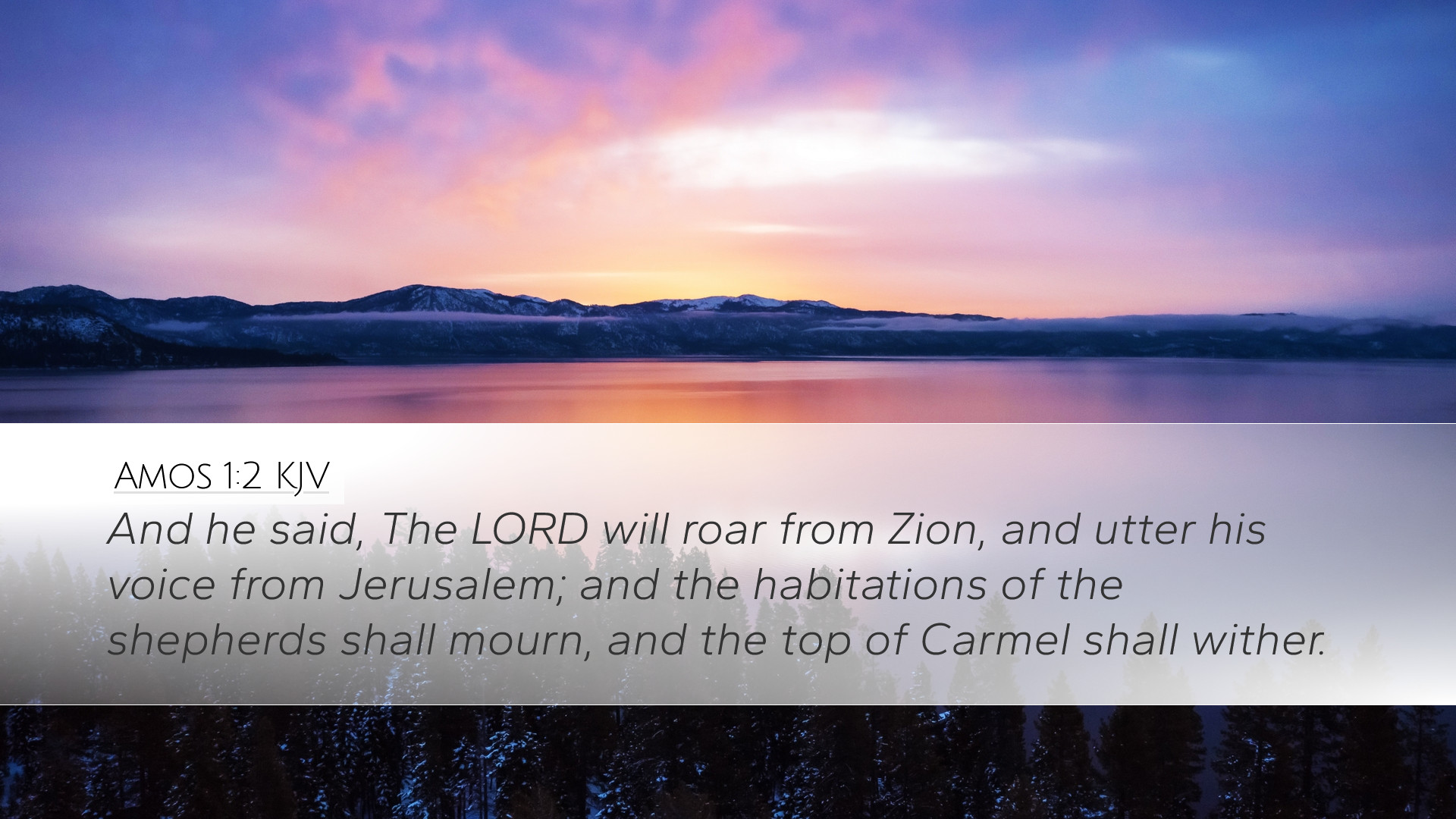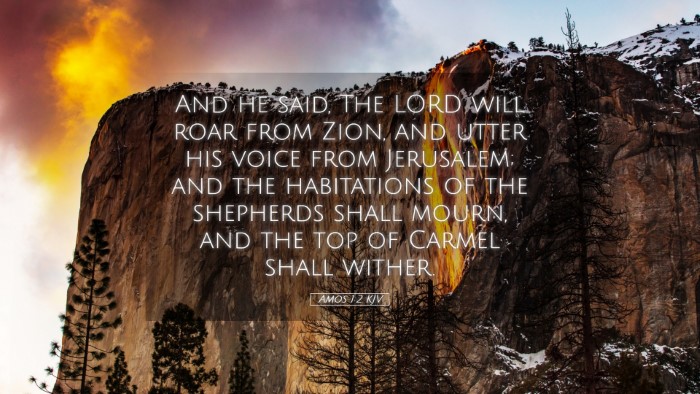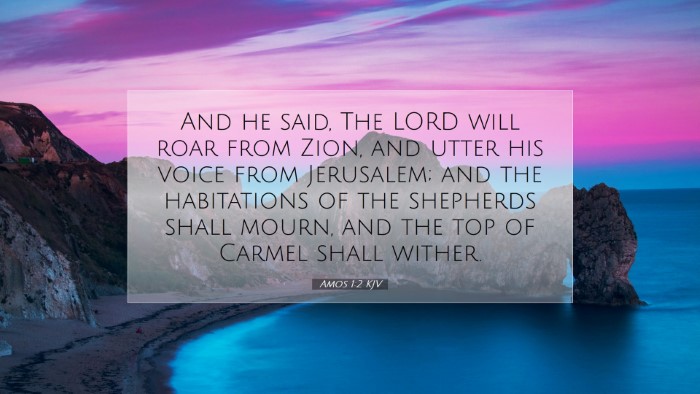Old Testament
Genesis Exodus Leviticus Numbers Deuteronomy Joshua Judges Ruth 1 Samuel 2 Samuel 1 Kings 2 Kings 1 Chronicles 2 Chronicles Ezra Nehemiah Esther Job Psalms Proverbs Ecclesiastes Song of Solomon Isaiah Jeremiah Lamentations Ezekiel Daniel Hosea Joel Amos Obadiah Jonah Micah Nahum Habakkuk Zephaniah Haggai Zechariah MalachiAmos 1:2
Amos 1:2 KJV
And he said, The LORD will roar from Zion, and utter his voice from Jerusalem; and the habitations of the shepherds shall mourn, and the top of Carmel shall wither.
Amos 1:2 Bible Commentary
Amos 1:2 Commentary
Verse: "And he said, The LORD will roar from Zion, and utter his voice from Jerusalem; and the habitations of the shepherds shall mourn, and the top of Carmel shall wither."
Introduction
Amos 1:2 stands as a profound proclamation from the prophet Amos, heralding the impending judgment of God. This verse encapsulates the gravity of divine speech and its effects upon both nature and humanity. The rich insights found in this text can be explored through the lens of various public domain commentaries, providing depth for pastors, theologians, and students.
Contextual Background
The Book of Amos is situated within a tumultuous period in Israel's history. Written during the reign of Jeroboam II, the nation experienced prosperity yet moral decay. Amos, a shepherd and fig tree farmer from Tekoa, is called by God to deliver a stern message to the Northern Kingdom of Israel. Understanding this social, economic, and spiritual backdrop is crucial for comprehending the significance of Amos's prophecy.
Exegesis of Amos 1:2
- The Divine Voice: The phrase "The LORD will roar from Zion" suggests the powerful and authoritative nature of God's voice. Matthew Henry asserts that just as a lion's roar commands attention, so does God's proclamation demand respect and acknowledgment.
- Location of Judgment: "From Zion" signifies the center of God's covenant relationship with Israel. Albert Barnes notes that Zion represents a place of worship and divine presence, from which God issues judgment, reinforcing the severe implications of abandoning covenant faithfulness.
- Covenant Consequences: The phrase "utter his voice from Jerusalem" symbolizes the epicenter of Israelite spirituality. Adam Clarke comments on how Jerusalem's significance amplifies the impact of the divine message, as it serves as the location where the people of God should have turned in repentance rather than rebellion.
- Response to the Divine Voice: The impact of God's roar elicits mourning from "the habitations of the shepherds". Here, the shepherds symbolize leaders and caretakers of the people. Henry elaborates on the sorrow that follows a public outcry against sin, leading to an acknowledgment of impending doom, particularly among those in leadership.
- Symbolic Imagery: The "top of Carmel shall wither" reflects nature's response to divine pronouncements. Barnes suggests that Mount Carmel, known for its beauty and fertility, symbolizes God's judgment that will impact the land itself. The withering of Carmel communicates the severity of God's impending actions and the totality of His judgment.
Theological Implications
Amos 1:2 holds significant theological weight, calling attention to the seriousness of God's word. This verse underscores the consequences of a departure from divine instruction and covenant loyalty. The imagery used by Amos reflects the consequences of Israel's moral failings, showing that disobedience has both spiritual and physical ramifications.
- Divine Sovereignty: The roaring of the LORD emphasizes His authority over nations and creation. God's voice commands reverence and signifies His sovereign rule over all realms.
- Call to Repentance: The mourning of the shepherds can be interpreted as a call for self-examination. The leaders of Israel were to guide the people towards righteousness, and their sorrow indicates the first step toward genuine repentance and humility before God.
- Nature’s Response: The withering of Carmel illustrates an intimate connection between humanity’s moral failing and the natural world. This could be viewed as a typological foreshadowing of the eventual restoration that follows repentance and divine mercy.
Practical Applications
For pastors and church leaders, Amos 1:2 serves as a powerful reminder of the weightiness of their call. The voice of God speaking through the Scriptures should evoke reverence, leading to action aimed at repentance and restoring the community to faithfulness.
- Preaching God’s Word: The importance of heralding the message of God requires clarity and urgency. Church leaders are reminded that their call is not merely to comfort but also to confront sin and urge repentance.
- Community Awareness: Engaging the congregation in recognizing the signs of moral decay can foster an atmosphere of accountability and collective introspection.
- Caring for Creation: The imagery of withering Carmel can also inspire a theology of creation care. Recognizing the effects of sin upon the world compels leaders to advocate for actions that honor God’s creation.
Conclusion
Amos 1:2 serves as a stark reminder of the power of God’s voice and the urgency of responding to His call. Insights from various public domain commentaries, such as those by Matthew Henry, Albert Barnes, and Adam Clarke, illuminate the depth and significance of this verse. It challenges individuals and communities alike to heed the divine message, confront issues of sin, and strive towards restoration through repentance.


